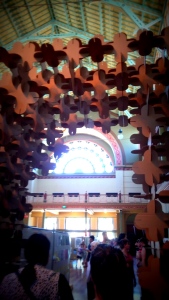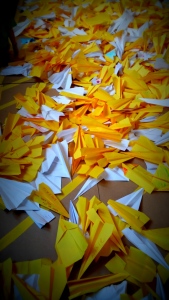In the last few weeks, I have stepped outside my comfort zone. I wasn’t expecting to feel this way. But my family has had a change – a new school. It’s not that far away, but far enough that it doesn’t feel like ‘home’ anymore. I have felt like I have abandoned my old community and replaced it with a new, unfamiliar, one. Is it better? Have I done the right thing? Maybe I should have just put up with the issues that forced the change, it would have been so much easier!
I consider myself flexible and easy going. I make good decisions. I like progress. But this change… it wasn’t so easy.
I am not alone. As human beings, we are in a constant tug of war between changes that are forced upon us – from job loss to relationship breakdowns, and changes we make ourselves to better our situation, like going on a diet or even taking a new route to work hoping there will be less congestion!
In all the uncertainty, we look for what is certain. We create certainties. Ensure there are things we know to be true and that we can rely on. It’s a bit like the scientific method:
– Form a hypothesis (I think cupcakes are better with sprinkles)
– Test the hypothesis (consume a cupcake with sprinkles and one without)
– Come to a conclusion (I am a cupcakes with sprinkles person, that’s what I’ll eat from now on)
Sometimes life’s not always that simple. The sprinkle recipe can change, your taste buds can change, sometimes you don’t get the choice. So we have to learn to cope with change.
So enough about cupcakes, what does this have to do with community?
Joining a new group of people or a new place, no matter how much you think this change is a good thing, will test your hypotheses about who you are in relation to your current neighbourhood and who you can be in your new setting.
So, I have been trying to:
- Allow myself to grieve the life I thought I was having and let go
- Reconnect in a new way to my community – I have visited the library, we have gone walking around the streets. I’m still part of my local area, just in a different way.
- Find the positives in the new experience – I have a new community to join with my old. My friends to make, new places to explore. I am further blessed by the expansion.
- Develop new routines. These help settle you down.
- Be patient, it takes time to adapt.
I have learnt that a strong bond with your local community is a great thing. My family and I are supported, connected and strengthened by our neighbourhood. But stretching beyond these imagined ‘boundaries’ widens your perspective as well. I am glad I stretched. I look forward to bonding with my new community more.
PS. My son is coping with his new school much better than me! The routines have helped, and the reassurance that he hasn’t ‘lost’ his old friends. More about helping kids to cope on Kids Matter here.






